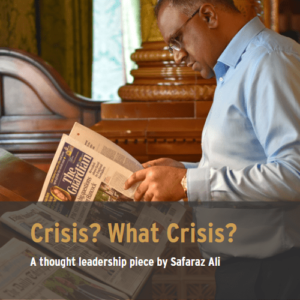Business Relevancy: The role of leaders
In today’s fast-paced and ever-evolving business landscape, staying relevant is not just about keeping up nor just a goal, it’s about leading and a necessity for survival and growth.
The pursuit of relevance has transcended the mere desire to be recognised within a crowded market. Today, it’s about creating a profound connection that resonates on both an emotional and practical level with your customers and stakeholders.
The role of leaders in this context cannot be overstated. Leadership is fundamentally about ensuring that the business remains pertinent, resonant, and dynamic in the face of shifting market demands, technological advancements, and global trends. The essence of business relevancy, and the role leaders play in maintaining it, is a multifaceted journey of continuous adaptation, innovation, and engagement.
Understanding the Core of Relevancy
At the heart of relevance lies a deep-rooted obsession with understanding and solving your customers’ problems. This isn’t about simply responding to their needs; it’s about anticipating them, crafting solutions that not only meet but exceed their expectations. Leaders must foster a culture where every team member, from the front lines to the executive suite, is aligned with this mission, ensuring that every innovation and decision is made with the customer in mind.
The aim being that you are so deeply embedded in the fabric of your market that your absence would create a noticeable void. This does not happen by accident. It requires a deliberate, strategic approach guided by forward-thinking leaders who proactively respond to shifts, often staying ahead of the curve to shape the future.

Leadership and the Pursuit of Innovation
Innovation for the sake of novelty is a short-lived strategy. True innovation — the kind that sustains relevance — is purposeful. Innovation is the lifeline of relevancy.
Entrepreneurially minded leaders understand that to innovate effectively, a culture that encourages experimentation, embraces failures as learning opportunities, and rewards creative thinking must be cultivated. Innovation, in this sense, is not limited to products or services but encompasses business models, processes, and customer experiences. Leaders must champion a mindset that views change as an enabler of opportunities, not a threat to the status quo.
By embedding innovation into the company culture, brands can foster an environment where creative solutions thrive, ensuring they remain at the forefront of their industry.
The Empathy Factor
The digital age has amplified the importance of creating authentic connections with customers. Leaders must foster empathy within their organisations—a deep understanding of and connection to the customers’ needs, emotions, and aspirations. This empathy becomes the cornerstone of designing products, services, and experiences that resonate on a personal level, ensuring relevancy through genuine engagement. The engagement as well goes beyond mere transactions and involves actively listening to customer feedback, participating in social conversations, and demonstrating a genuine commitment to their values and concerns. Through authentic engagement, companies build trust and loyalty, which are indispensable for long-term relevance.
Agility in Adaptation
The only constant in today’s business environment is change. The hallmark of a relevant business is its agility—the ability to pivot quickly in response to new information, trends, or market dynamics. Entrepreneurial leaders lead by example, demonstrating how to balance long-term vision with the flexibility to make swift, informed decisions. Agility in business processes, decision-making, and strategic planning allows companies to navigate the uncertainties of the market with confidence.
Purpose Beyond Profit
In an era where consumers are increasingly values-driven, businesses that stand for something beyond profit tend to resonate more deeply. Leaders play a crucial role in defining and embodying the company’s mission and values, aligning them with societal and environmental responsibilities. This purpose-driven leadership not only elevates the brand’s relevancy but also fosters a sense of loyalty and trust among consumers and employees alike.
Insight-Driven Strategy
Maintaining relevance requires a profound understanding of the market, competitors, and especially, the evolving behaviours and expectations of consumers. Leaders invest in gathering and analysing data to gain insights that inform strategy. This knowledge-driven approach enables businesses to pre-emptively adjust their offerings and stay ahead of customer demands, ensuring they remain relevant in a competitive landscape.
Building a Future-Proof Organisation
The journey towards sustained business relevance is ongoing and ever-changing. Leaders must continually challenge themselves and their teams to look beyond the horizon, to innovate, and to adapt. This involves not just keeping pace with technological advancements but integrating them seamlessly into the business to enhance customer value. It means not just responding to market changes but actively participating in shaping the market through thought leadership and strategic partnerships.
Leadership as the Catalyst for Relevancy
The journey to maintain business relevance demands a leadership role that is both intricate and essential. At its core, it calls for leaders to instil a culture marked by innovation, empathy, adaptability, and a clear sense of purpose. Those entrepreneurial leaders, including CEOs, who effectively weave these values into their organisation’s ethos, pave the way for sustained achievement.
They understand that staying relevant is not a destination but a continuous journey—an energetic interplay between grasping the present and crafting the future. In doing so, they don’t just secure their and their company’s spot in the competitive marketplace of today but in the hearts of their audience for years to come.
Safaraz Ali, Featured in the Business Influencer Magazine
The Struggle for Effectiveness: Why Boards Often Fail to Deliver
The role of a board of directors is more critical than ever. Boards are responsible for steering companies toward long-term...
Business Relevancy: The role of leaders
In today’s fast-paced and ever-evolving business landscape, staying relevant is not just about keeping up nor just a goal, it’s...
Scaling Up Success: From Growth to Scaling
Scaling up Success: From Growth to Scaling Scaling is a very specific type of company growth which isn’t right for...
The Hidden Truth About Business Books: They Don’t Work Unless You Do!
The hidden truth about business books – They don’t work unless you do! In an age where over 15,000 business...
The unwritten rules in a Company: Who, What & Why?
The unwritten rules in a Company: Who, What & Why? Unwritten Company Rules are the routines or behaviours followed by...
It starts with trust and grows because of trust
It starts with trust and grows because of trust The fundamental of any relationship, business or otherwise, is trust. Someone...
Scaling A Business: Best Way Ahead & Common Pitfalls To Avoid
Scaling A Business: Best Way Ahead & Common Pitfalls To Avoid When businesses scale, it is often said that they...
Crisis? What Crisis?
Crisis? What Crisis? A thought leadership piece by Safaraz Ali, for The Business Influencer publication As business leaders, we regard...
The Importance of Social Entrepreneurship | The Business Influencer Podcast | Episode 34
The Importance of Social Entrepreneurship The Business Influencer Podcast | Episode 34 The Business Influencer Podcast – interview and explore...
Power To The People – The Talent Revolution
Power To The People – The Talent Revolution Business models are adjusting not just because of technology but also because...
Great People Make Great Businesses & Great Businesses Create Great Teams
Great People Make Great Businesses & Great Businesses Create Great Teams WHEN the American space programme was in its infancy...
Why more business leaders should turn their hand to writing?
Why more business leaders should turn their hand to writing? Have you often thought ‘I should write’ but then the...
Are You Failing Your Managers?
Are You Failing Your Managers? Managers are often the single most important factor in any organisation’s success. They can often...













